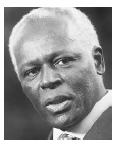ANGOLA
Jose Eduardo dos Santos
President

(pronounced "JOE-zay ed-WAHR-doh dose SAN-tose")
"I vow to struggle for strengthened national unity for the fulfillment of the worker-peasant alliance, and for the building of people's power."
The Republic of Angola is situated on the Atlantic (west) coast of Africa, just south of the Congo River. It is bordered to the north and east by the Democratic Republic of the Congo (former Zaire), to the southeast by Zambia and to the south by Namibia. The national territory covers 1,246,700 sq km (481,226 sq mi) and includes the enclave of Cabinda in the northwest. The capital is Luanda. Angola's population, estimated at 10.6 million in 2002, is primarily Bantu, who come from four distinct groups: the Bakongo in the northwest, the Kimbundu in the north-central region, the Ovimbundu in the south-central region, and the Chokwe in the east. Portuguese is the official language; of the several African languages, none is sufficiently universal to be adopted officially.
The unit of currency is the kwanza ; inflation has rendered it virtually worthless both at home and abroad, which has allowed a black market to flourish. The Angolan economy, once prosperous and still possessing massive potential, has been devastated by civil war. The per capita gross domestic product (GDP) was estimated at US $1,330 in 2001. Exports include crude oil, coffee, and diamonds. Potentially the breadbasket for all of southern Africa, Angola relies on massive food imports to avert widespread famine. Guerrilla activity has driven the peasants off the land, either to cities or neighboring countries. Despite war and political uncertainty, Cabinda's offshore oil reserves generate more than 85% of government revenue and attract private foreign investment.
ADDRESS
Gabinete do Presidente
Luanda, Angola
Comment about this article, ask questions, or add new information about this topic: